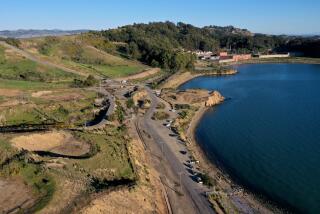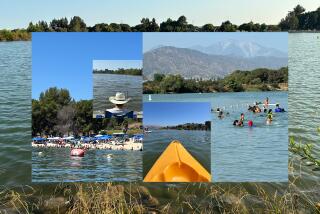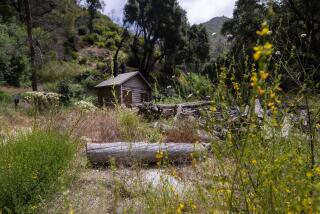Fake lakes: It’s tricky business keeping them afloat
Pyramid Lake — I AM STANDING ON A SCRUBBY slope, squinting down at a large, boatless body of water, listening to a roar that is not the ocean. Grrrrr.
It’s the sound of gears grinding, as the daily current of cars and trucks rushes across the Grapevine on I-5. But the water below is still and quiet. Which is not natural. Or maybe it is. Frankly, I’m beginning to lose track.
What’s clear is that Pyramid Lake needs a new pharaoh. The gates have been padlocked since late January, and the pooh-bahs of the Angeles National Forest are looking for a concessionaire to take over this 1,300-acre reservoir, sell bait and snacks and keep an eye on the swimmers, campers, fishers, boaters and water-skiers. In the meantime, they plan to open Friday for “extremely limited” boating and fishing.
By prevailing wisdom, a robust recreational reservoir roars with powerboats, teems with imported fish and serves, every pleasant weekend, as a tension-release chamber for thousands of otherwise seething city people. It’s something like the natural world, what with the fish, the water, the fresh air and all. And just like growing portions of the publicly owned natural world these days, it had better bring in some dollars, or else.
For several years now, cash-strapped government agencies at all levels have been looking to extract more revenue from natural and semi-natural resources that once could rely on heavy subsidies.
The most controversial example may be the U.S. Forest Service’s user-fee system, an 8-year-old test program in which hikers and others pay for access. But escalating national park admission rates, booming state camping charges and creeping local recreational fees are part of the same larger picture. In this landscape, concessionaires and public entities alike are groping for dollars like never before. As the still waters at Pyramid suggest, the results can get nasty -- and Pyramid isn’t the only cautionary tale in this neighborhood.
About 20 miles south of Pyramid Lake lies Castaic Lake (actually two bodies of water), another dammed reservoir, this one covering 11,200 acres. Unlike Pyramid, which is run by the feds with frequent state involvement, Castaic is owned by the state and operated by Los Angeles County. It has long been popular for fishing, swimming and boating, with an estimated 1.2 million visitors a year. But it costs money to run, and last August, county officials announced that they couldn’t afford to keep it open.
Then came the finger-pointing and dire predictions of what a closure would do to the community of Castaic. The state -- which back in 1969 signed an agreement making the county responsible for the area -- -- threatened to sue. Finally state and county officials scraped up enough to keep the facility open and boosted user fees to shave net operating costs. (Starting Thursday, bathers of all ages will pay $2 to enter the swimming area.) Closure averted.
Despite the boost in fees, reports county regional park superintendent Dana Robertson, attendance is running “a good 10%” ahead of last year.
But just as the crisis was calming at Castaic, another sort of money trouble surfaced like a sinister fin at Pyramid Lake. And this time, there was no last-minute rescue.
Until 1973, when the engineers and crews of the State Water Project came along, Pyramid Lake was as dry as the rest of the canyons near the top of the Tehachapi Pass. Filled with water on its way south to Los Angeles, the reservoir was placed in the hands of the Forest Service, which found a concessionaire to oversee visiting city folk -- about 200,000 a year -- as they floated boats; cast for bass, crappie and catfish; and laid out picnics on the few flat spots around the 22-mile shoreline.
But by early this year, something had gone seriously wrong in relations between Piru-based Pyramid Enterprises, the longtime concessionaire at the site, and the Forest Service. On Jan. 27 the Forest Service announced that the concessionaire hadn’t been paying its fees, terminated its permit and closed the lake.
At Pyramid Enterprises, Christopher Cowles, vice president for business development, calls this a problem with “many layers,” and points out that his company manages successful concessions in collaboration with L.A. County and the Los Padres National Forest. The main trouble at Pyramid Lake, Cowles contends, is that his company couldn’t get the Forest Service to agree on an agenda of infrastructure improvements.
Meanwhile, the gates have been padlocked for five months. To reopen the lake’s Emigrant Landing area to picnickers and boaters on Friday, the feds have ordered repairs and hired temporary workers. But the swimming beach will remain closed. So will the Los Alamos campground and the Vaquero day-use area parking lot and boat ramp. (Access fees, however, will go unchanged: $7 for cars, $14 to $21 for RVs and other vehicles with trailers, $3 for bicycles and motorcycles.)
Forest Service officials say they’ve set a July 25 deadline for bids from would-be concessionaires, and hope to restore the whole operation by November.
Whatever happens here, Cowles says, public agencies nationwide will likely keep up their push to make concessionaires pay more. And if they’re paying more, you can be sure that we will too.
So the new pharaoh of Pyramid Lake, whoever he or she is, will inherit an evolving, unquiet realm, from this canyon full of still water to the humming freeway up the hill. And we, the wading and power-boating masses -- we may already own this water and these canyons, but we’ve only begun to pay for them.
To e-mail Christopher Reynolds or to read his previous Wild West columns, go to latimes.com/chrisreynolds.



